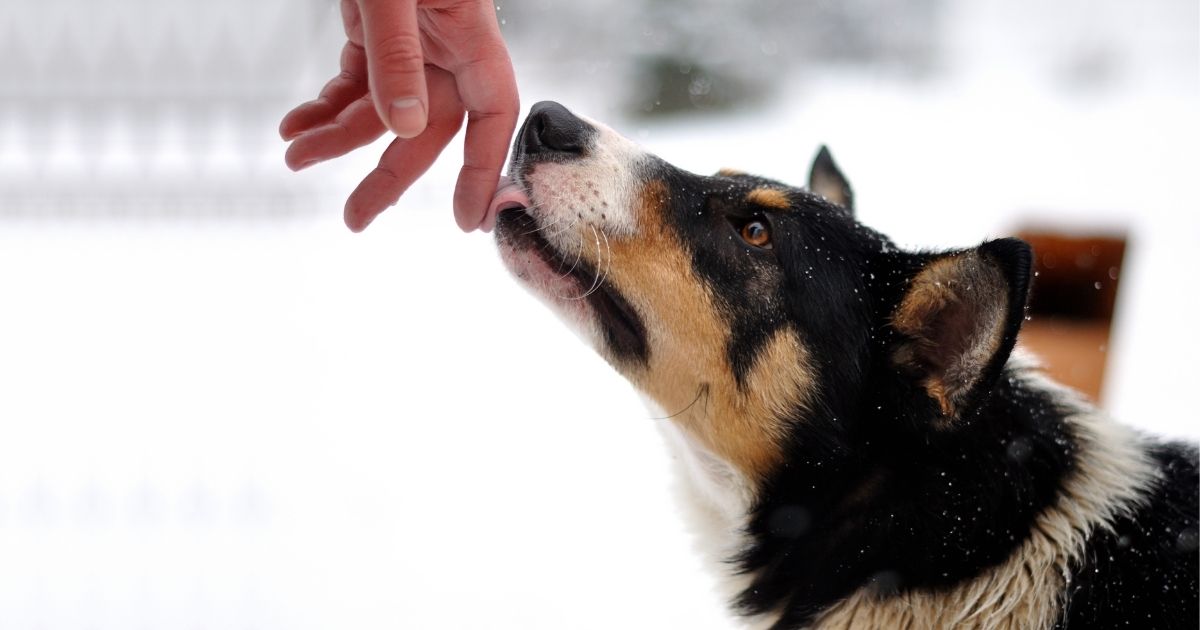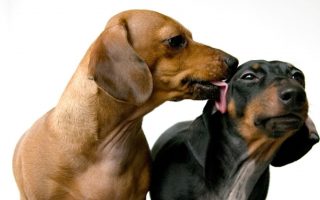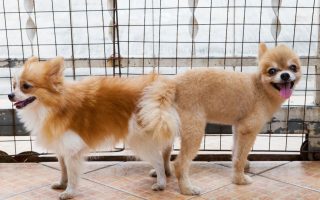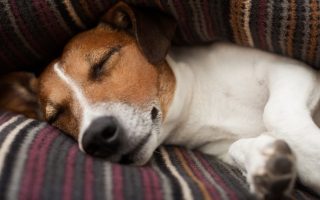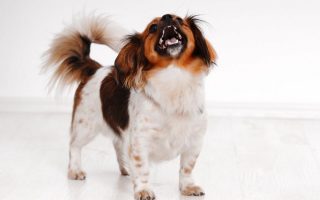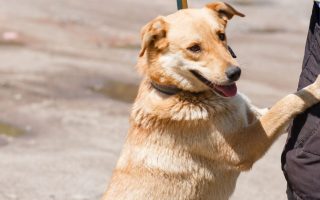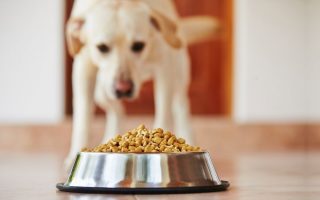How many times have you caught yourself thinking: Why does my dog lick my wounds?
There are many canine behaviors that baffle dog owners. Dogs tend to bark at nothing, howl, lick themselves, even rub their butts on the floor!
However, it is behaviors that occur around us that make us weirded out the most.
It happened to me several times: I got a papercut, and my Labrador would come to me instantly and start licking the finger with the cut.
I wondered about this behavior for a long time. Should I allow him to do this, or should I stop him and disinfect my wound afterward?
Here’s what I’ve found out:
Why Does My Dog Lick My Wounds?
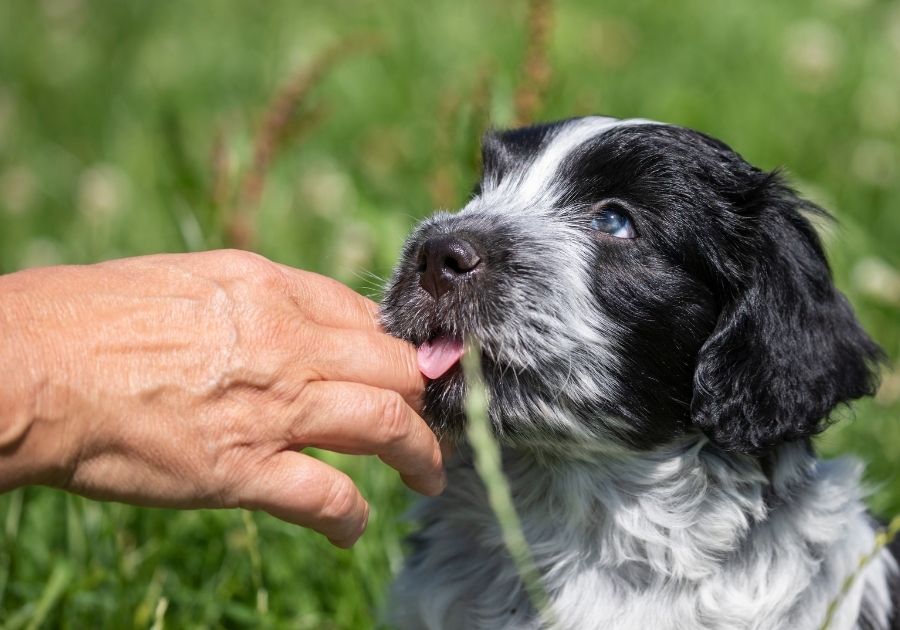
Wound licking is an instinctive behavior for many animals. In fact, even we humans tend to do this!
How many times have you caught yourself putting your papercut finger into your mouth and sucking on it?
Kids are especially prone to this behavior, and if you’re a parent, chances are it took you some time to teach your little one out of this behavior.
As such, the next time you wonder: Why does my dog lick my wounds?, remember that these are simply his natural instincts.
In general, these instincts can be split in two categories:
- Dogs use saliva to treat their wounds.
- They like the taste of blood.
Before you start panicking – no, your dog won’t kill you in your sleep just because he licked your blood.
However, blood is rich in salt and trace minerals. Many dogs love this taste, and they’ll lick it because it’s like a treat for them.
This is the same reason why dogs might enjoy the taste of many other body fluids, such as sweat or urine.
The Root Of The Behavior
When you are injured, your first thought is to tend to the wound. The same goes for canines and other pets.
Many people think that dogs love the taste of blood, and this is why they are licking your wound. However, most of the time this isn’t the case. All your pooch is trying is to speed up the healing process.
Dogs are pack animals. They love their pack members and they are very compassionate. If they think their family members are in danger, they will do all they can to help them.
Dogs lick wounds as this is the only way they know to deal with injuries. They use the healing properties of their saliva to clean the area. This is knowledge they are born with.
When you get a new puppy, he’ll start considering you a part of their pack. As such, he’ll want to ensure you are feeling well at all times.
If he notices you are wounded, his instinct is to help you out. This can include wound licking and even gentle nibbling.
Is Dog Saliva Good For Wounds?
Even ancient Egyptians believed that canine saliva could help heal injuries! In the end, if dogs lick their own wounds and this seems to help, why wouldn’t it help humans, as well?
Even the ancient Greeks believed that dogs’ saliva heal wounds, and they used it as a way to tend to those in need.
As it turns out, both dog and human saliva can promote healing. This is thanks to several proteins and enzymes it contains, but also a few antimicrobial and antibacterial properties.
For example, saliva contains a protein called histatin. Histatin has properties that can fight off infections by helping the cells on the skin’s surface close the wound.
The nitrite found in saliva breaks into nitric oxide when in contact with skin. This is yet another great substance for healing wounds.
Also, saliva contains a so-called nerve growth factor that is yet another protein that speeds up healing. It also contains the antimicrobial enzyme lysozyme.
Not just that, but there are indications that dog saliva can help slow the bacterial growth of Escherichia coli (E. coli), Streptococcus, and Staphylococcus.
Finally, when a dog licks your wound, he’ll remove any dirt and debris that might otherwise cause infection.
Dog’s tongue will loosen anything that might be on your wound, and with the help of saliva, remove it from your skin.
Is Dog Saliva Bad For Wounds?
Unfortunately, things aren’t entirely black or white. While dog saliva can help speed up wound healing thanks to all the nitrates and enzymes, it can also have many adverse effects.
Your dog doesn’t want to cause you harm. However, what might be good for him isn’t always good for you – especially with the help of modern medicine that allows us to tend to our wounds in a much safer way.
Here are two reasons why you shouldn’t allow your dog to lick you wounds:
Introducing Bacteria To The Wound
First off, a dog’s mouth is filled with bacteria. No, it isn’t necessarily cleaner than a human mouth.
However, the type of bacteria found in dogs isn’t the same as the one found in humans, and this usually ends badly.
The main culprit behind this is the bacteria Pasteurella multocida. Pasteurella is commonly found in dogs and cats. It grows the best in areas that don’t contain much air, and deep wounds are a haven for it.
When an open wound gets infected with Pasteurella, the infection can become so severe an amputation might be necessary.
There are even reported cases of humans dying from excessive bacterial growth after their wounds were licked by their dogs.
As such, if you’d like to make sure your wound is disinfected, you should stick to standard hand soap.
Reopening The Wound
Not just that, but excessive licking might produce a counter-effect and keep the wound from closing.
Dog’s tongue isn’t as smooth as it looks. Sure, it isn’t as textured as a cat’s tongue, but it is still pretty rough to the touch.
Wounds need to scab over in order to heal properly and allow the skin to repair. For this to happen, wounds need to be left alone.
The first time you allow your pooch to lick your wound he’ll try on licking it constantly, and this isn’t good. The wound will constantly be irritated, and this can take forever to heal.
Of course, you shouldn’t be worried the first time your pooch starts licking you. A gentle lick or two won’t cause any harm. However, if he keeps on doing this, you’ll be in huge trouble.
How To Stop My Dog From Licking My Wounds?
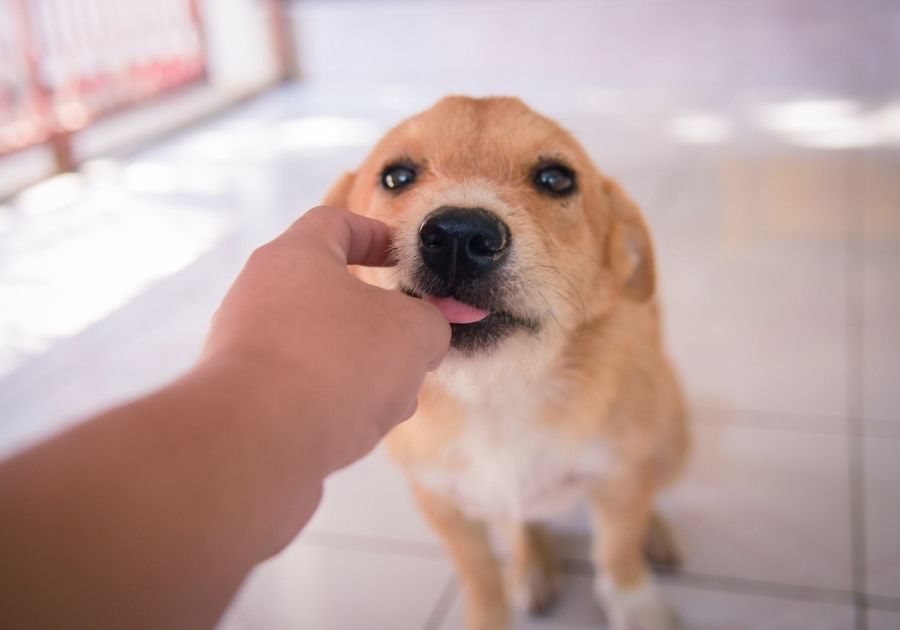
It shouldn’t be too challenging to keep your doggie from licking your wounds, especially if he’s properly trained.
The most effective method is to treat the wound on your own. Use proper antiseptics for minor wounds and cover them with a bandaid.
This way, your pooch won’t be able to reach it when you’re not paying attention.
However, if you have a large, more severe injury, you need to go to your doctor who will explain how to treat the injury and clean it up.
This is important, as dogs aren’t likely to lick clean, disinfected wounds. The smell of blood attracts dogs – although, in this case, it probably isn’t what you think.
Your dog doesn’t want to eat you – he simply wants to help you feel better.
Finally, you need to make sure your pooch is properly trained. A dog who knows commands will listen when you tell him to leave your wound alone and to stop with the current behavior.
You don’t need a professional dog trainer for such easy commands. Just be consistent and don’t crack under the puppy eyes your dog is giving you.
A properly-behaved dog will never do what you don’t allow him to.
Should A Dog Lick His Own Wounds?
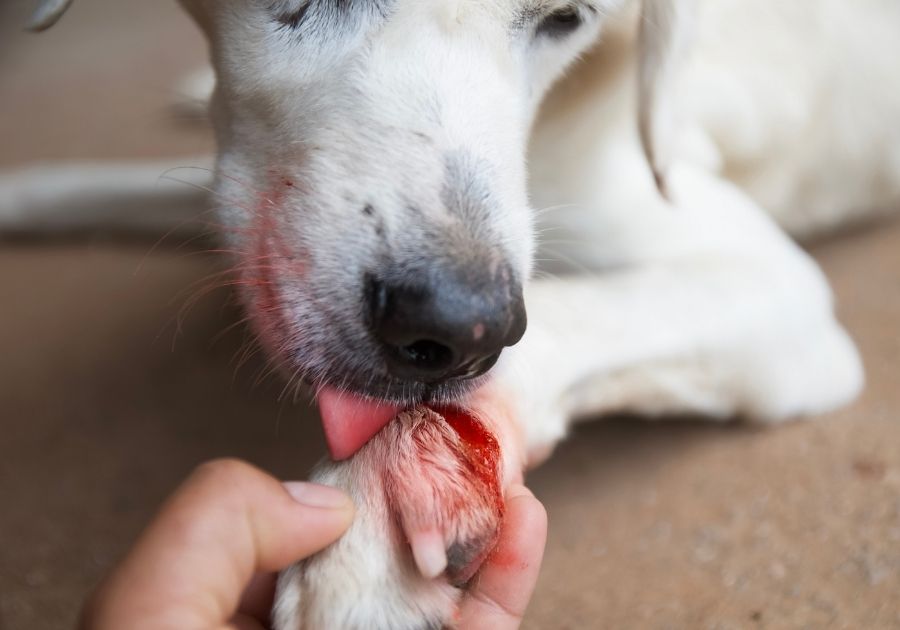
Dog saliva can not just cause harm to human wounds, but to your pooch himself. In fact, most vets will adamantly advise you to keep your dog from licking his wounds, especially after surgery.
If a dog excessively licks his wound, he is paving the way for many fungal and bacterial infections. While this is rarely life-threatening, it can slow down the healing.
As I mentioned, licking can also reopen wounds over and over again. This can end with numerous visits to the vet.
While minor wounds are rarely a problem, things get trickier after invasive medical procedures.
In fact, your dog might end up going home with a cone of shame (officially called the Elizabethan collar, but I find a cone of shame to be a much more suitable name) to keep him from licking the sutures.
Another consequence of a dog licking his own wound is hotspots.
As such, the moment you hear scrapes, you need to quickly scold your pooch and find a way to keep him from repeating this action.
Prevention Methods
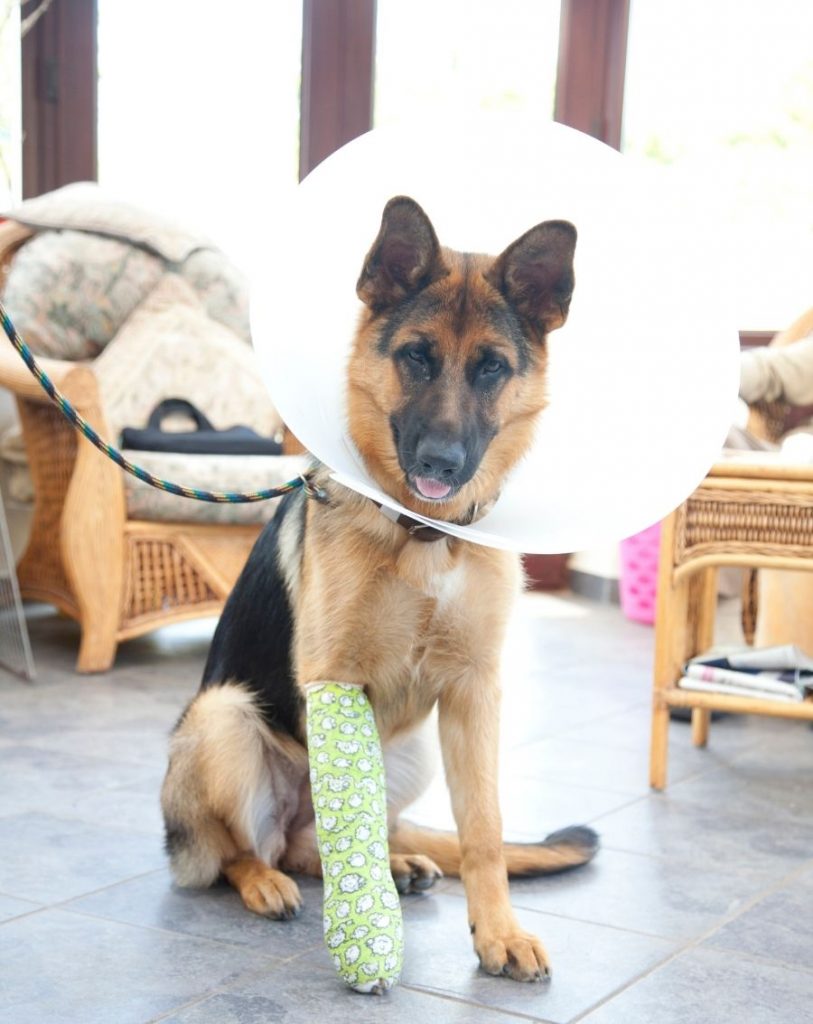
Keeping your pooch from doing what he wants can be tricky, especially if you own dog breeds that are known for their stubbornness.
Still, there are a few tips and tricks you can do when your pooch just won’t stop licking:
- Put an old T-shirt on your dog. Not only will this make him look cute, but if the wound is somewhere on his body, this will keep him from licking.
- If your pooch is licking and nibbling on his paws, try finding a paw bandage. If you cannot get one in the area where you live, simply take your old sock, put it on your dog’s problematic paw, then make it stay in place with adhesive surgical tape.
- Some of the new products you can find are specially designed recovery suits for dogs. These are made to make your dog’s body safe from his licking habits. Many of such suits have tactically-placed openings so your pooch can still do his business without taking the suit off.
- Ask your vet to recommend you a high-quality antiseptic spray. This will help your dog’s wound heal quickly, which will stop him from wanting to lick it.
- You might want to listen to your vet and get an Elizabethan collar.
Conclusion
The next time you think: Why does my dog lick my wounds and should I allow him to do this?, think about Pasteurella and other harmful bacteria this might infect you with.
As cute as it sounds to allow your pooch to tend to your wounds, they might end up causing more harm than good. As such, I would advise you against encouraging this behavior.
Try not to be mad at your dog for attempting this activity. He isn’t doing this to be rude or annoying – he just wants to help you.
Your pooch cannot put a bandaid on your wound, nor can he take you to the doctor. He’ll do the only thing he knows, and that is to lick your wound to help it heal more easily.
Dogs consider us their family members, and family members stick together and help each other feel better.
Still, try to keep your dog from using his saliva on your wound. Wash your cut with soap and put a bandaid on it if necessary.
Finally, if all else fails, get an Elizabethan collar for your pooch. Not only will this prevent licking – it will surely cause a few laughs.

